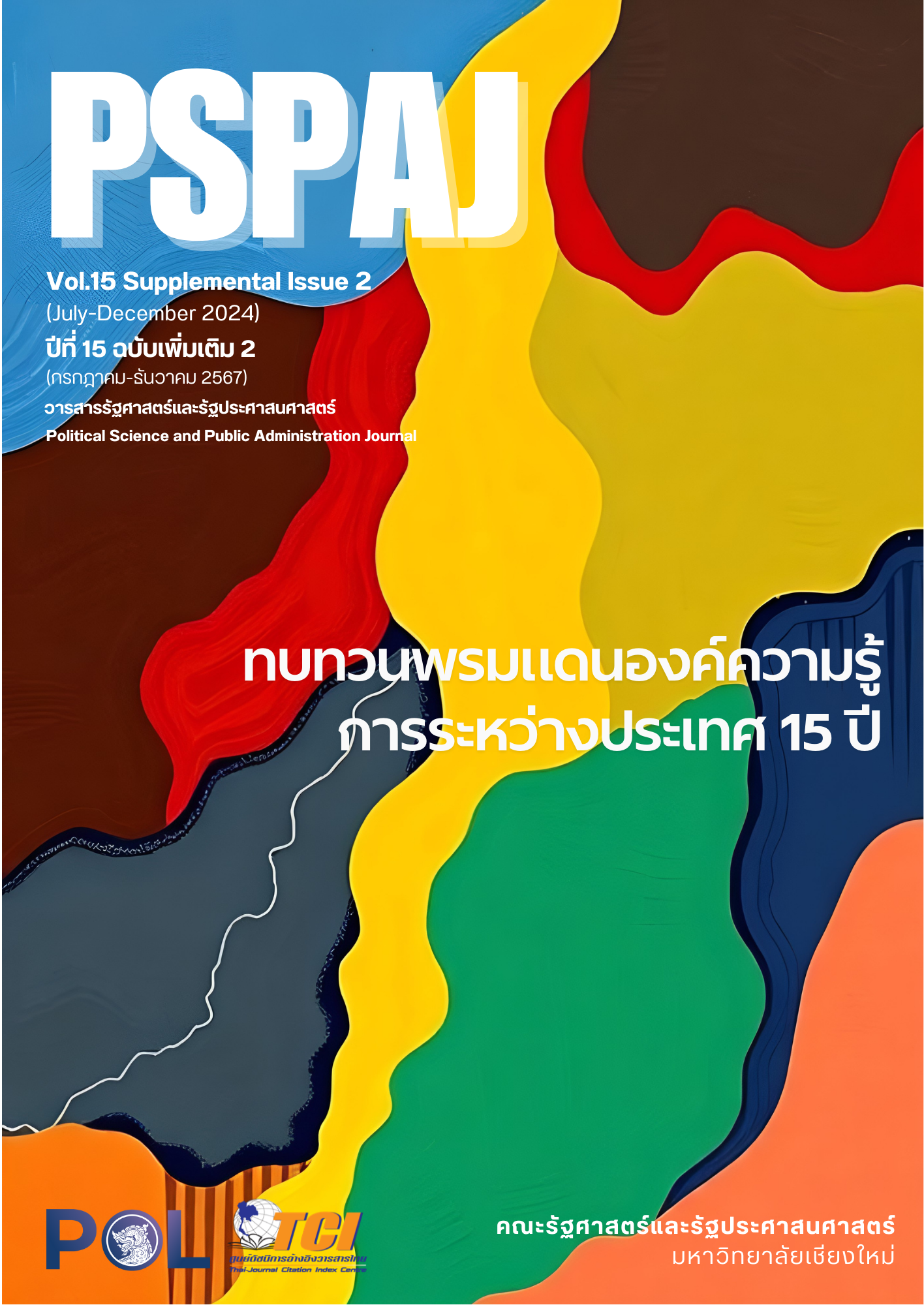Power, Knowledge, and Representation: A Critical Analysis of Conflict History Presentation in History Textbooks of Thailand, Vietnam, and Cambodia and Its Impact on International Bilateral Relations
Main Article Content
Abstract
This article critically examines the representation of conflict history in history textbooks from Thailand, Vietnam, and Cambodia through critical discourse analysis. The study revealed that textbooks from these three countries tend to reproduce nationalist historical narratives, emphasizing national mythologies, minimizing the significance of neighboring nations, and accentuating historical conflicts. This pattern reflects state power in shaping and directing citizens' understanding of history. Such historical representations significantly influence the formation of citizens' attitudes and the bilateral relations between nations. The article proposes developing history textbooks with a more multifaceted approach, fostering academic exchanges among historians, and establishing conflict management mechanisms that account for historical and cultural contexts. These recommendations aim to promote mutual understanding and peaceful coexistence between the countries under study.
Downloads
Article Details

This work is licensed under a Creative Commons Attribution-NonCommercial-NoDerivatives 4.0 International License.
- เนื้อหาและข้อมูลที่ลงตีพิมพ์ในวารสารรัฐศาสตร์และรัฐประศาสนศาสตร์ถือเป็นข้อคิดเห็นและความรับผิดชอบของผู้เขียนบทความโดยตรง ซึ่งกองบรรณาธิการวารสารรัฐศาสตร์และรัฐประศาสนศาสตร์ ไม่จำเป็นต้องเห็นด้วย หรือร่วมรับผิดชอบใดๆ
- บทความและข้อมูล ที่ได้รับการตีพิมพ์ในวารสารรัฐศาสตร์และรัฐประศาสนศาสตร์ ถือเป็นลิขสิทธิ์ของวารสาร หากบุคคลหรือหน่วยงานใดต้องการนำข้อมูลไปใช้ประโยชน์ในทางวิชาการ ขอให้อ้างอิงแหล่งที่มาด้วย
References
ปวินญาพัฒน์ วรพันธ์, จิณณวัตร เลิศประดิษฐ์, และสรรชัย โสมนัสวงศ์วานิช. (2562). การวิเคราะห์แนวคิดราชาชาตินิยมในแบบเรียนประวัติศาสตร์ไทยระดับชั้นมัธยมศึกษาตอนปลาย. วารสารวิชาการมหาวิทยาลัยศรีนครินทรวิโรฒ, 11(21), 175-188.
ปวินญาพัฒน์ วรพันธ์, และปริชัย ดาวอุดม. (2567). การวิเคราะห์การประกอบสร้างวาทกรรมความเป็นชาติผ่านความรู้ทางศาสนาในแบบเรียนสังคมศึกษาระดับมัธยมศึกษาตอนปลาย. วารสารศิลปศาสตร์ มหาวิทยาลัยอุบลราชธานี, 20(1), 106-132.
สำนักงานคณะกรรมการการศึกษาขั้นพื้นฐาน. (2553). หนังสือเรียนรายวิชาพื้นฐานประวัติศาสตร์ ชั้นมัธยมศึกษาปีที่ 4-6. กรุงเทพฯ: โรงพิมพ์ สกสค. ลาดพร้าว.
สำนักพิมพ์อักษรเจริญทัศน์. (2562). หนังสือเรียนรายวิชาเพิ่มเติมประวัติศาสตร์ไทย ชั้นมัธยมศึกษาปีที่ 4-6. กรุงเทพฯ: อักษรเจริญทัศน์.
สิทธิชัย สุขคะตะ, และณัฐวีณ์ บุนนาค. (2558). การวิเคราะห์วาทกรรมชาตินิยมไทยในแบบเรียนสังคมศึกษาและประวัติศาสตร์. วารสารสหวิทยาการวิจัย: ฉบับบัณฑิตศึกษา, 4(1), 126-137.
สุนทร สุขสราญจิต. (2551). มายาคติและความรุนแรงของภาพแสดงแทนชาวเขาในแบบเรียน บทเพลง และภาพยนตร์ (วิทยานิพนธ์ปริญญามหาบัณฑิต), บัณฑิตวิทยาลัย มหาวิทยาลัยเชียงใหม่.
Allport, G. W. (1954). The Nature of Prejudice. Cambridge: Addison-Wesley.
Althusser, L. (1971). Ideology and Ideological State Apparatuses. In Althusser, L. (Ed.). Lenin and Philosophy and Other Essays (pp. 127-186). New York: Monthly Review Press.
Anderson, B. (2006). Imagined Communities: Reflections on the Origin and Spread of Nationalism (Revised edition). London: Verso Books.
Apple, M. W. (2004). Ideology and Curriculum (3rd ed.). New York, NY: Routledge.
Becker, H. S. (1963). Outsiders: Studies in The Sociology of Deviance. New York: Free Press Glencoe.
Bentrovato, D., Korostelina, K. V., & Schulze, M. (Eds.). (2016). History Can Bite: History Education in Divided and Postwar Societies. Göttingen: V&R unipress GmbH.
Billig, M. (1995). Banal Nationalism. London: Sage Publications.
Bộ Giáo dục và Đào tạo. (2006). Lịch Sử Việt Nam 10. Hanoi: Nhà xuất bản Giáo dục.
Carretero, M., Berger, S., & Grever, M. (Eds.). (2017). Palgrave Handbook of Research in Historical Culture and Education. London: Palgrave Macmillan.
Chachavalpongpun, P. (2012). The Politics of History Education in Thailand.
In Chachavalpongpun, P., & Croissant, A. (Eds.). The Politics of History Education in Southeast Asia (pp. 83-104). Göttingen: Hubert & Co.
Chandler, D. (2008). A History of Cambodia (4th ed.). Boulder, CO: Westview Press.
Defrance, C., & Pfeil, U. (2013). Symbol or Reality? The Background, Implementation, and Development of the Franco-German History Textbook. In Korostelina, K. V., & Lässig, S. (Eds.). History Education and Post-Conflict Reconciliation: Reconsidering Joint Textbook Projects (pp. 52-68). London: Routledge.
Dy, K. (2007). A History of Democratic Kampuchea (1975-1979). Phnom Penh: Documentation Center of Cambodia.
Foucault, M. (1980). Power/Knowledge: Selected Interviews and Other Writings, 1972-1977. New York, NY: Pantheon Books.
Fuchs, E., & Bock, A. (Eds.). (2018). The Palgrave Handbook of Textbook Studies. London: Palgrave Macmillan.
Gottesman, E. (2003). Cambodia After the Khmer Rouge: Inside the Politics of Nation Building. New Haven, CT: Yale University Press.
Gramsci, A. (1971). Selections from the Prison Notebooks. London: Lawrence and Wishart.
Halbwachs, M. (1992). On Collective Memory. (Coser, L. A. Ed. & Trans.). Chicago, IL: University of Chicago Press.
Hall, S. (1996). Introduction: Who Needs ‘Identity’? In Hall, S., & du Gay, P. (Eds.). Questions of Cultural Identity (pp. 1-17). London: Sage Publications.
Hobsbawm, E., & Ranger, T. (1983). The Invention of Tradition. Cambridge: Cambridge University Press.
London, J. D. (2014). Politics in Contemporary Vietnam: Party, State, and Authority Relations. London: Palgrave Macmillan.
Ministry of Education, Youth and Sport. (2018). History Textbook for Grade 11. Phnom Penh: Ministry of Education, Youth and Sport.
Ministry of Education, Youth and Sport. (2020). History Textbook for Grade 12. Phnom Penh: Ministry of Education, Youth and Sport.
Naseem, M. A., Arshad-Ayaz, A., & Rodríguez-Rodríguez, J. A. (2021). Representation of Minorities in Textbooks: International Comparative Perspectives. London: Palgrave Macmillan.
Nguyen, T. T. (2016). Lịch Sử 11. Hanoi: Nhà xuất bản Giáo dục Việt Nam.
Nhà xuất bản Giáo dục Việt Nam. (2020). Lịch Sử Việt Nam 11. Hanoi: Nhà xuất bản Giáo dục Việt Nam.
Renan, E. (1990). What Is a Nation? In Bhabha, H. K. (Ed.). Nation and Narration (pp. 8-22). London: Routledge.
Repoussi, M., & Tutiaux-Guillon, N. (2010). New Trends in History Textbook Research: Issues and Methodologies Toward a School Historiography. Journal of Educational Media, Memory, and Society, 2(1), 154-170.
Said, E. W. (1978). Orientalism. New York, NY: Pantheon Books.
Salomon, M., & Vu, D. K. (2007). Đổi Mới, Education and Identity Formation in Contemporary Vietnam. Compare: A Journal of Comparative and International Education, 37(3), 345-363. https://doi.org/10.1080/03057920701330222
Smith, A. D. (1991). National Identity. Reno, NV: University of Nevada Press.
Stuart-Fox, M. (2003). A Short History of China and Southeast Asia: Tribute, Trade and Influence. Sydney: Allen & Unwin.
Thuzar, M., Mishra, R., Hutchinson, F., Than, T. M. M., & Chalermpalanupap, T. (2019). The State of Southeast Asia: 2019 Survey Report. Singapore: ISEAS-Yusof Ishak Institute.
Todosijević, A. (2020). History Education as a Means for Reconciliation and Conflict Prevention. In Psaltis, C., Carretero, M., & Čehajić-Clancy, S. (Eds.). History Education and Conflict Transformation (pp. 249-271). London: Palgrave Macmillan.
Tran, N. T. (2019). Vietnamese Historiography and Cultural Resistance to China.
In Sai, S., & Hoon, C. Y. (Eds.). Contesting the State in Southeast Asia: Social Conflicts and Public Resistance (pp. 175-194). Singapore: World Scientific.
Vickers, E., & Jones, A. (Eds.). (2005). History Education and National Identity in East Asia. London: Routledge.
Wang, Z. (2009). Old Wounds, New Narratives: Joint History Textbook Writing and Peacebuilding in East Asia. History & Memory, 21(1), 101-126.
Winichakul, T. (2013). Siam's Colonial Conditions and the Birth of Thai History. In Grabowsky, V. (Ed.). Southeast Asian Historiography Unravelling the Myths: Essays in Honour of Barend Jan Terwiel (pp. 20-41). Bangkok: River Books.


